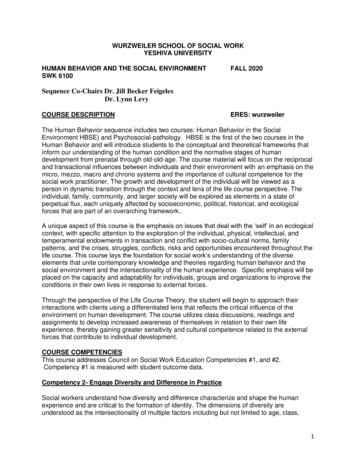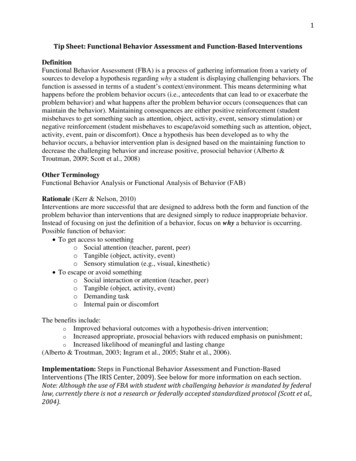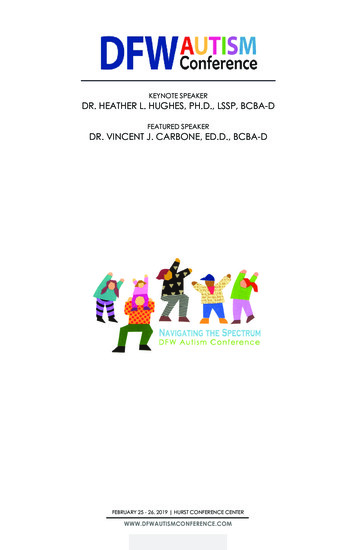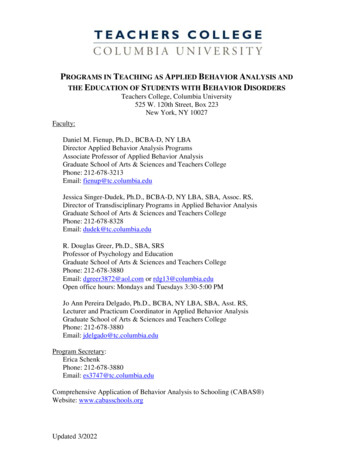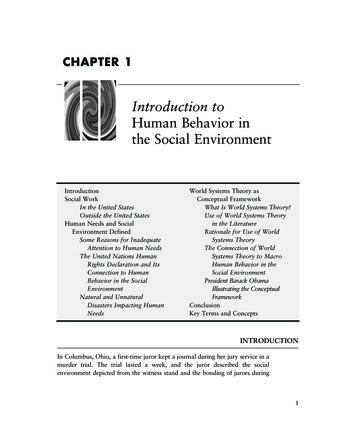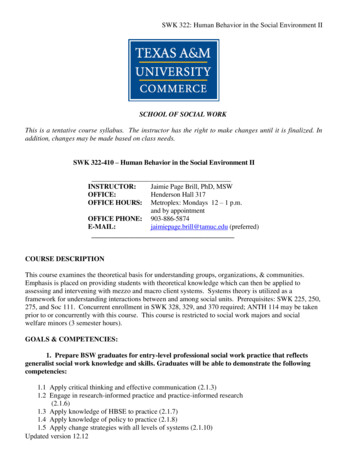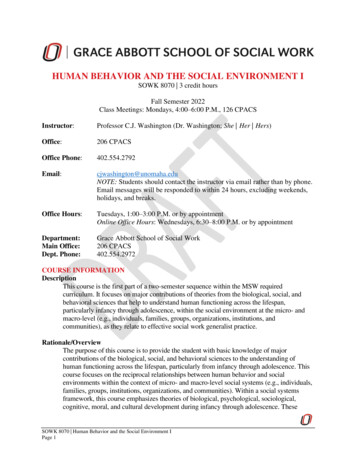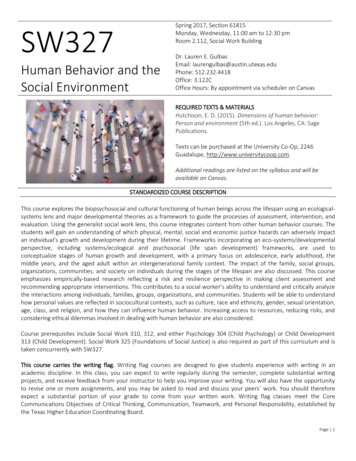
Transcription
Spring 2017, Section 61815Monday, Wednesday, 11:00 am to 12:30 pmRoom 2.112, Social Work BuildingSW327Human Behavior and theSocial EnvironmentDr. Lauren E. GulbasEmail: laurengulbas@austin.utexas.eduPhone: 512.232.4418Office: 3.122COffice Hours: By appointment via scheduler on CanvasREQUIRED TEXTS & MATERIALSHutchison, E. D. (2015). Dimensions of human behavior:Person and environment (5th ed.). Los Angeles, CA: SagePublications.Texts can be purchased at the University Co-Op, 2246Guadalupe, http://www.universitycoop.com.Additional readings are listed on the syllabus and will beavailable on Canvas.STANDARDIZED COURSE DESCRIPTIONThis course explores the biopsychosocial and cultural functioning of human beings across the lifespan using an ecologicalsystems lens and major developmental theories as a framework to guide the processes of assessment, intervention, andevaluation. Using the generalist social work lens, this course integrates content from other human behavior courses. Thestudents will gain an understanding of which physical, mental, social and economic justice hazards can adversely impactan individual’s growth and development during their lifetime. Frameworks incorporating an eco-systems/developmentalperspective, including systems/ecological and psychosocial (life span development) frameworks, are used toconceptualize stages of human growth and development, with a primary focus on adolescence, early adulthood, themiddle years, and the aged adult within an intergenerational family context. The impact of the family, social groups,organizations, communities, and society on individuals during the stages of the lifespan are also discussed. This courseemphasizes empirically-based research reflecting a risk and resilience perspective in making client assessment andrecommending appropriate interventions. This contributes to a social worker’s ability to understand and critically analyzethe interactions among individuals, families, groups, organizations, and communities. Students will be able to understandhow personal values are reflected in sociocultural contexts, such as culture, race and ethnicity, gender, sexual orientation,age, class, and religion, and how they can influence human behavior. Increasing access to resources, reducing risks, andconsidering ethical dilemmas involved in dealing with human behavior are also considered.Course prerequisites include Social Work 310, 312, and either Psychology 304 (Child Psychology) or Child Development313 (Child Development). Social Work 325 (Foundations of Social Justice) is also required as part of this curriculum and istaken concurrently with SW327.This course carries the writing flag. Writing flag courses are designed to give students experience with writing in anacademic discipline. In this class, you can expect to write regularly during the semester, complete substantial writingprojects, and receive feedback from your instructor to help you improve your writing. You will also have the opportunityto revise one or more assignments, and you may be asked to read and discuss your peers’ work. You should thereforeexpect a substantial portion of your grade to come from your written work. Writing flag classes meet the CoreCommunications Objectives of Critical Thinking, Communication, Teamwork, and Personal Responsibility, established bythe Texas Higher Education Coordinating Board.Page 1
STANDARDIZED COURSE OBJECTIVESBy the end of the course, the student will be able to:1. Explain the unique perspective that social work has in viewing the relationship between the individual person andenvironment in comparison to other helping professions (PB 24);2. Explain and apply basic principles of learning theories and the system-ecological and psychosocial frameworks andanalyze individual, family, group, organizational, community, and societal dynamics from each of these perspectives(PB 24);3. Describe biological, social, cultural, psychological, and spiritual aspects of adolescent, early adult, middle adult, andolder adult developmental states within the context of the broader environment (PB 24);4. Describe the dynamics of social groups, organizations, communities, and society, and the ways that they can impactindividual development and behavior (PB 24);5. Explain ways that ethnicity, culture, gender, sexual orientation, class, disability, and other factors contribute to humandevelopment and their implications for social work practice in assessment, intervention, and evaluation (PB 23);6. Describe relevant research and identify and conceptualize additional research needs relating to human behavior andthe social environment;7. Apply information and theories related to human behavior in the social environment to life situations in a mannerconsistent with social work values and the promotion of social and economic justice (PB 24);8. Use critical thinking skills in writing an academic literature review on a human development question of interest;9. Explain and apply basic principles of learning theories and the systems/ecological and psychosocial frameworks toguide the processes of assessment, intervention, and evaluation (PB 23);10. Apply information and theories related to human behavior and social environment to life situations in order todetermine the ways social systems promote or deter people in maintaining or achieving health and well-being (PB 24).ACCREDITATIONThe University of Texas’ School of Social Work has been continuously accredited by the Council on Social Work Education(CSWE) since 1952. In order to maintain our accreditation status, we engage in ongoing curriculum assessment todemonstrate compliance with CSWE’s Education Policies and Accreditation Standards (EPAS). Several required courses inour curriculum are part of this ongoing assessment, including this course. Below if a list of the specific Educational Policies(EP) and Practice Behaviors (PB) that are assessed in this course. The complete EPAS can be found in your StudentHandbook.E.P.2.1.7 APPLY KNOWLEDGE OF HUMAN BEHAVIOR IN THE SOCIAL ENVIRONMENTPB 23Utilize conceptual frameworks to guide the processes of assessment, intervention, and evaluation.Course Objectives: 5, 9Assignment: Literature review paper, theory presentations, examsPB 24Critique and apply knowledge to understand person and environmentCourse Objectives: 1, 2, 3, 4, 7, 10Assignment: Literature review paper, theory presentations, examsUNIVERSITY POLICIESTHE UNIVERSITY OF TEXAS HONOR CODE. The core values of The University of Texas at Austin are learning, discovery,freedom, leadership, individual opportunity, and responsibility. Each member of the university is expected to upholdthese values through integrity, honesty, trust, fairness, and respect toward peers and community.Page 2
PROFESSIONAL CONDUCT AND CIVILITY IN THE CLASSROOM. The professor expects students to act as professionals inclass. This means students should arrive on time for class, be prepared to participate in the class discussion, and showrespect for one another’s opinions. A course brings together a group of diverse individuals with various backgrounds.Students are influenced and shaped by such factors as ethnicity, gender, sex, physical abilities, religious and politicalbeliefs, national origins, and sexual orientations, among others. We expect to learn from each other in an atmosphere ofpositive engagement and mutual respect. Social Work also deals with complex and controversial issues. These issues maybe challenging and uncomfortable, and it would be impossible to offer a substantive classroom experience that did notinclude potentially difficult conversations relating to challenging issues. In this environment we will be exposed to diverseideas and opinions, and sometimes we will not agree with the ideas expressed by others. Nevertheless, the professorrequires that students engage one another with civility, respect, and professionalism.DOCUMENTED DISABILITY STATEMENT. Any student who requires special accommodations must obtain a letter thatdocuments the disability from the Services for Students with Disabilities area of the Division of Diversity and CommunityEngagement (471-6259 voice or 471-4641 TTY for users who are deaf or hard of hearing). A student should present theletter to the professor at the beginning of the semester so that needed accommodations can be discussed and followed.The student should remind the professor of any testing accommodations no later than five business days before an exam.More information may be found at TED DISTRESS. Students may experience unexpected and/or distressing reactions to course readings, videos,conversations, and assignments. If so, students are encouraged to inform the professor. The professor can be responsiveand supportive regarding students’ participation in course assignments and activities, but students are responsible forcommunicating clearly what kind of support is desired. If counseling is needed, students may contact a service provider oftheir choosing, including the UT Counseling Center at 512-471-3515 or online at https://cmhc.utexas.edu/.POLICY ON SCHOLASTIC DISHONESTY. Students who violate University rules on scholastic dishonesty are subject todisciplinary penalties, including the possibility of failure in the course and/or dismissal from the University. Since suchdishonesty harms the individual, all students, and the integrity of the University, policies on scholastic dishonesty will bestrictly enforced. For further information, the student may refer to the Web Site of the Student Judicial Services, Office ofthe Dean of Students (http://deanofstudents.utexas.edu/conduct/).POLICY ON SOCIAL MEDIA AND PROFESSIONAL COMMUNICATION. Public social networks are not private. Even when openonly to approved or invited members, users cannot be certain that privacy will exist among the general membership ofsites. If social work students choose to participate in such forums, please assume that anything posted can be seen, read,and critiqued. What is said, posted, linked to, commented on, uploaded, subscribed to, etc., can be accessed andarchived, posing potential harm to professional reputations and prospective careers. Social work students who use socialmedia (i.e. Facebook, Twitter, etc.) and other forms of electronic communication (i.e. blogs, etc.) must be mindful of howtheir communication may be perceived by clients, colleagues, faculty, and others. Social work students are expected tomake every effort to minimize material which could be considered inappropriate for a professional social worker intraining. Because of this, social work students are advised to manage security settings at their most private levels andavoid posting information/photos or using any language that could jeopardize their professional image. Students areasked to consider the amount of personal information posted on these sites and are obliged to block any client access toinvolvement in the students’ social networks. Client material should not be referred to in any form of electronic media,including any information that might lead to the identification of a client or compromise client confidentiality in any way.Additionally, students must critically evaluate any material that is posted regarding community agencies and professionalrelationships, as certain material could violate the standards set by the School of Social Work, the Texas Code of Conductfor Social Workers, and/or the NASW Code of Ethics. Social work students should consider that they will be representingprofessional social work practice as well as The University of Texas at Austin School of Social Work program while in theclassroom, the university community, and the broader area communities.USE OF COURSE MATERIALS. The materials used in this course, including, but not limited to exams, quizzes, and homeworkassignments, are copyright protected works. Any unauthorized duplication of the course materials is a violation of federalPage 3
law and may result in disciplinary action being taken against the student. Additionally, the sharing of course materialswithout the specific, express approval of the professor may be a violation of the University’s Student Honor Code and anact of academic dishonesty, which could result in further disciplinary action. This sharing includes, among other things,uploading class materials to websites for the purpose of distributing those materials to other current or future students.RELIGIOUS HOLIDAYS. By UT Austin policy, students must notify the professor of a pending absence at least fourteen daysprior to the date of observance of a religious holy day. If the student must miss a class, examination, work assignment, orproject in order to observe a religious holy day, the professor will give the student an opportunity to complete the missedwork within a reasonable time after the absence.CAMPUS CARRY POLICY. The University’s policy on concealed fire arms may be found here:https://campuscarry.utexas.edu. You also may find this information by accessing the Quick Links menu on the School’swebsite.USE OF E-MAIL FOR OFFICIAL CORRESPONDENCE TO STUDENTS. Email is recognized as an official mode of universitycorrespondence; therefore, students are responsible for reading their email for university and course-related informationand announcements. Students are responsible for keeping the university informed about a change of e-mail address.Students should check their e-mail regularly and frequently—daily, but at minimum twice a week—to stay current withuniversity-related communications, some of which may be time-sensitive. Students can find UT Austin’s policies andinstructions for updating their e-mail address at nic-mail-studentnotification-policy.CLASSROOM CONFIDENTIALITY. Information shared in class about agencies, clients, and personal matters is consideredconfidential per the NASW Code of Ethics on educational supervision and is protected by regulations of the FamilyEducational Rights and Privacy Act (FERPA) as well. As such, sharing this information with individuals outside of theeducational context is not permitted. Violations of confidentiality could result in actions taken according to the policiesand procedure for review of academic performance located in sections 3.0, 3.1, and 3.2 of the Standards for Social WorkEducation.TITLE IX REPORTING. In accordance with Title IX of the Education Amendments of 1972, the University of Texas at Austin iscommitted to maintaining a learning environment that is free from discriminatory conduct based on gender. Faculty,instructors, staff, and/or teaching assistants in their supervisory roles are mandated reporters of incidents of sexdiscrimination, sexual harassment, sexual violence, or sexual misconduct. Students who report such incidents will beinformed of University resources. Incidents will be reported to the University’s Title IX Coordinator and/or the Title IXDeputy for the SSW, Professor Tanya Voss. Students, faculty and staff may contact Professor Voss to report incidents or toobtain information. Further information, including student resources related to Title IX, may also be found rograms/other/qrg-sexualharassment.pdf.SAFETY. As part of professional social work education, students may have assignments that involve working in agencysettings and/or the community. As such, these assignments may present some risks. Sound choices and caution maylower risks inherent to the profession. It is the student's responsibility to be aware of and adhere to policies and practicesrelated to agency and/or community safety. Students should notify the professor regarding any safety concerns.BEHAVIOR CONCERNS ADVICE LINE (BCAL). If students are worried about someone who is acting differently, they may usethe Behavior Concerns Advice Line to discuss by phone their concerns about another individual’s behavior. This service isprovided through a partnership between the Office of the Dean of Students, the Counseling and Mental Health Center(CMHC), the Employee Assistance Program (EAP), and The University of Texas Police Department (UTPD). Call 512-2325050 or visit age 4
EMERGENCY EVACUATION POLICY. Occupants of buildings on the UT Austin campus are required to evacuate andassemble outside when a fire alarm is activated or an announcement is made. Please be aware of the following policiesregarding evacuation: Familiarize yourself with all exit doors in the classroom and the building. Remember that the nearest exit doormay not be the one you used when entering the building.If you require assistance to evacuate, inform the professor in writing during the first week of class.In the event of an evacuation, follow the professor’s instructions.Do not re-enter a building unless you are given instructions by the Austin Fire Department, the UT Austin PoliceDepartment, or the Fire Prevention Services office.CLASSROOM POLICIESPARTICIPATION. You are expected to participate actively in classroom discussions. This means coming to class havingcompleted the readings for that day and bringing both your questions and ideas, thoughts, reflections concerning thosereadings. If class discussion lags, I will not hesitate to call on you to offer your ideas. I also encourage you to bring“additional” sources of information to share with the class as pertaining to the topic(s) of discussion. This may includesharing information you have learned from other classes, news or pop culture media, or simply relating your ownexperiences and observations of everyday life.We will be discussing a variety of issues that may hold special significance to students. It is important to discuss ideas in asupportive and respectful manner, acknowledging that others may have different opinions. I encourage you to see thingsfrom a different point of view and use feedback from each other to augment your ideas. And while I encourage debateand disagreement as a productive aspect of classroom discussion, all students will be expected to act in a respectfulmanner towards classmates, the professor, and any guest speakers at all times.To help foster a productive learning environment, each member of this class should avoid behaviors that are disruptive toother students and the professor. This means: Turning off cell phones before coming to class. If you must keep your cell phone available for emergency purposes,please notify me before class. Do not hold side conversations with your classmates at any time during class. Computers are not allowed in this class. Although instruction will consist of both lecture and class discussion,discussion is a crucial part of the learning process. The use of computers often distracts from this productive activity.LATE WORK. Late work will be penalized 10% for every 24-hour period following the deadline for a given assignment(including weekends), and will only be accepted in the first week following an assignment’s due date. Please note that thelate policy does not apply to in-class quizzes or other in-class activities. If you anticipate being unable to meet anassignment deadline, let me know in advance.GRADED ASSIGNMENTSFor all written assignments, you are required to properly cite and reference your sources of information. Any quotation,concept, idea, or piece of information that is taken directly or paraphrased from another source must be properly citedand referenced according to American Psychological Association (APA) guidelines. If you have any questions or are unsureabout what constitutes plagiarism, please come see me. I also strongly encourage you to take advantage of the UniversityWriting Center (http://uwc.utexas.edu/). All graded assignments will be scored according to a grading rubric. These will beavailable on Canvas, and I encourage you to reference them in advance of completing the assignment so that you areinformed of the criteria you need to meet to achieve your desired grade!Page 5
Grade ScaleA94.0 A90.0 – 93.999B 87.0 – 89.999B84.0 – 86.999B80.0 – 83.999C CCD D77.0 – 79.99974.0 – 76.999170.0 – 73.99967.0 – 69.99964.0 – 66.999DF60.0 – 63.999Below 60.0Please Note: Grades will not berounded.MONTE CARLO QUIZZES (10%).1 Good participation means good preparation! To measure your preparation for class, therewill be several “Monte Carlo” quizzes given throughout the term. A Monte Carlo quiz is similar to a pop-quiz except thatthe decision to administer a quiz during a given class meeting is determined entirely by chance! At the beginning of class,a student will roll a die. If an odd number is rolled, a quiz will be given. The quiz is not open book (unless indicatedotherwise), but you may bring in notes and refer to them during the quiz. You cannot make-up a quiz, and extra time willnot be provided if you arrive late to class. Your lowest quiz grade will be dropped.“THEORY” PRESENTATION (20%). You will have an opportunity to lead a class discussion based on an analysis of one of thetheoretical perspectives presented in your textbook (Chapter 2). The class presentation is a group effort, and each groupshould have no more than three students. The purpose of the presentation is to consider how a given theoreticalperspective can assist you in thinking about social work across personal and environmental dimensions. As part of thisassignment, you will: 1) collect information about the theoretical perspective; 2) prepare a presentation for the class toteach them about your theoretical perspective and its applications to social work; 3) develop a handout for the class thatexplains key components of your theoretical perspective; and 4) write an individual critique of your group’s presentation.Detailed instructions for this assignment will be available on Canvas and presented in class.EXAMS (30%). There will be two exams given in this class. Exams will consist of multiple choice, short answer questions,and essays where you will have an opportunity to cover materials from class lectures, discussions/debates, and reading;films are considered equivalent to lecture material. If you are unable to take an exam on the assigned date for any reasonother than an emergency, you must notify your professor at least one week in advance of the test date. If you do not, itcould result in not taking the exam. On exam days, arrive to class on time. If you arrive late, extra time will not be givenfor the exam. If you do not take the exam, you may be in jeopardy of not passing the course. Each exam is worth 15% ofyour grade for total weight of 30%.LITERATURE REVIEW PAPER (40%). You will select a topic of interest related to human behavior and the social environmentand write a literature review paper that analyzes and synthesizes empirical research to complete a scholarly review onthat topic. This paper allows you to conduct an in-depth examination of a specific topic that you find interesting byreading, reviewing, and analyzing what other scholars have written about the topic. Through this assignment, you willdemonstrate critical thinking skills and mastery of American Psychological Association (APA) writing format. Your criticalthinking skills will be reflected through analyzing and synthesizing a minimum of three research-based, peer-reviewedjournal articles and integrating this research to formulate a conclusion about your topic. The paper should be between 8and 12 double-spaced pages using Times New Roman 12-point font and one-inch margins. The page limit does not includethe title page or reference list pages. You are responsible for turning the assignment in on time the day that it is due.Computer and/or printer problems are not an acceptable excuse for late assignments, and thus, the late policy will applyunder such circumstances. To facilitate your successful completion of this assignment, you will submit severalcomponents throughout the semester. Detailed instructions for this assignment will be available on Canvas and presentedin class.Page 6
WEEKLY SCHEDULE OF READINGS AND ASSIGNMENTSJan. 18 Course IntroductionJan. 23 The Dimensions of Person and EnvironmentRequired Reading: Hutchinson, Chapter 1, Human Behavior: A Multidimensional Approach, p. 3-34Jan. 25 Searching the LiteratureAssignment Due: Dimension, Topic, & Research QuestionRecommended Reading: Brainstorming. g/Jan. 30 Understanding and Evaluating Theoretical ParadigmsRequired Reading: Hutchinson, Chapter 2, Theoretical Perspectives on Human Behavior, p. 35-76Feb. 1 Surveying the LiteratureAssignment Due: One highlighted article for lit. reviewRecommended Reading: Pautasso, M. (2013). Ten simple rules for writing a literature review. PLoS computational biology, 9(7), 1-4.Feb. 6 Analyzing the LiteratureAssignment Due: Second highlighted article for lit. reviewRecommended Reading: How to build a paper research database. r-class-how-to-build-a-paperresearch-database/ Galvan, J. L. (2006). General guidelines for analyzing literature. In Writing literature reviews: A guide for students of the social andbehavioral sciences (3rd ed., pp. 31-42). Los Angeles, CA: Pyrczak Publishing.Feb. 8 Cognition, Emotion, and SelfhoodRequired Reading: Hutchinson, Chapter 4, The Psychological Person, p. 115-143Feb. 13 The Psychosocial FrameworkRequired Reading: Hutchinson, Chapter 5, The Psychosocial Person, p. 145-176Feb. 15 Developing a Writing Plan, Writing an IntroductionAssignment Due: DUE: Research TableRecommended Reading: Belcher, W. (2009). Anticipating writing obstacles. In Writing your journal article in 12 weeks (pp. 26-38). Thousand Oaks, CA: SagePublications. Argument. e 7
Feb. 20 Spirituality and Religion BeliefsRequired Reading: Hutchinson, Chapter 6, The Spiritual Person, p. 177-222Feb. 22 Writing a Literature ReviewAssignment Due: Draft of IntroductionRecommended Reading: Nadell, J., Langan, J., Coxwell-Teagure, D. (2015). Writing the paragraphs in the first draft. In The Longman writer (9th ed., p. 6391). Harlow, UK: Longman Publishing.Feb. 27 Biology as a SystemRequired Reading: Hutchinson, Chapter 3, The Biological Person, p. 79-114Mar. 1 Exam ReviewAssignment Due: Outline of lit. reviewRecommended Reading: Outlines. https://www.youtube.com/watch?v sp0MWYbLUFUMar. 6 * * * EXAM * * *Mar. 8 The Physical and Built EnvironmentRequired Reading: Hutchinson, Chapter 7, The Physical Environment, p. 225-256Mar. 20 The Culture ConceptRequired Reading: Hutchinson, Chapter 8, Culture, p. 257-290Mar. 22 When Cultures CollideFilm: Rain in a Dry LandMar. 27 Receiving and Using Peer FeedbackAssignment Due: First draft of lit. review paperRecommended Reading: Why peer review? iew.htmMar. 29 From Social Structure to Structural ViolenceRequired Reading: Hutchinson, Chapter 9, Social structure and social institutions, p. 291-336Apr. 3 Understanding and Working with FamiliesRequired Reading: Hutchinson, Chapter 10, Families, p. 337-380Page 8
Apr. 5 Integrating Environmental Dimensions: Kingdom of WomenAssignment Due: Revised draft of lit. reviewRecommended: Revising Drafts. fts/Apr. 10 The Dynamics of Small GroupsRequired Reading: Hutchinson, Chapter 11, Small Groups, p. 381-412Apr. 12 Case Analysis PresentationsApr. 17 Types of CommunitiesRequired Reading: Hutchinson, Chapter 13, Communities, p. 447-478Apr. 19 Case Analysis PresentationsApr. 24 Perspectives on Formal OrganizationsRequired Reading: Hutchinson, Chapter 12, Formal Organizations, p. 413-445Apr. 26 Understanding Social MovementsAssignment Due: Individual critique of your “theory” presentationRequired Reading: Hutchinson, Chapter 14, Social Movements, p. 479-512May 1 Exam ReviewAssignment Due: Final lit. review paperMay 3 * * * EXAM * * *1Fernald, P. S. (2004). The Monte Carlo Quiz: Encouraging punctual completion and deep processing of assigned readings. College Teaching, 52(3), pp. 95-99.Page 9
7. Apply information and theories related to human behavior in the social environment to life situations in a manner consistent with social work values and the promotion of social and economic justice (PB 24); 8. Use critical thinking skills in writing an academic literature review on a human development question of interest; 9.


